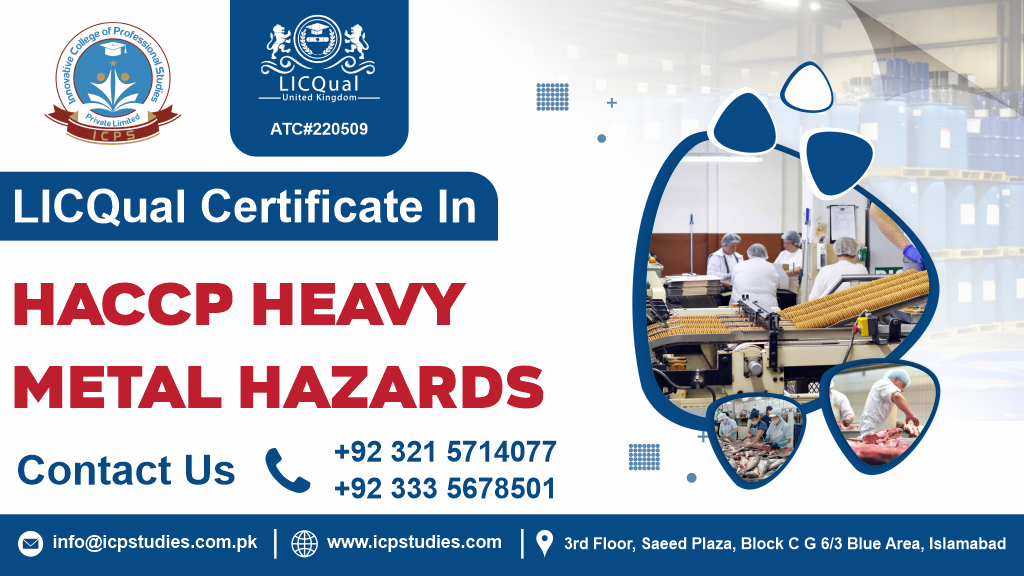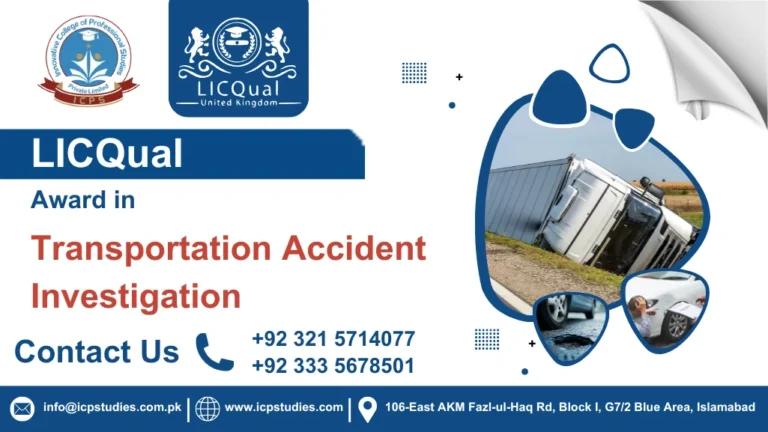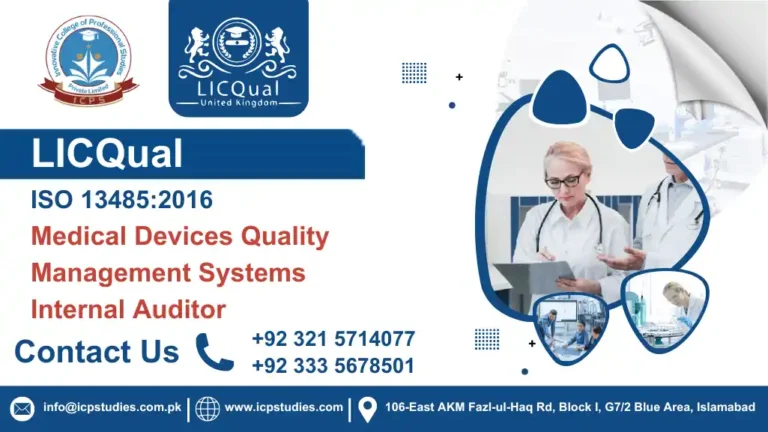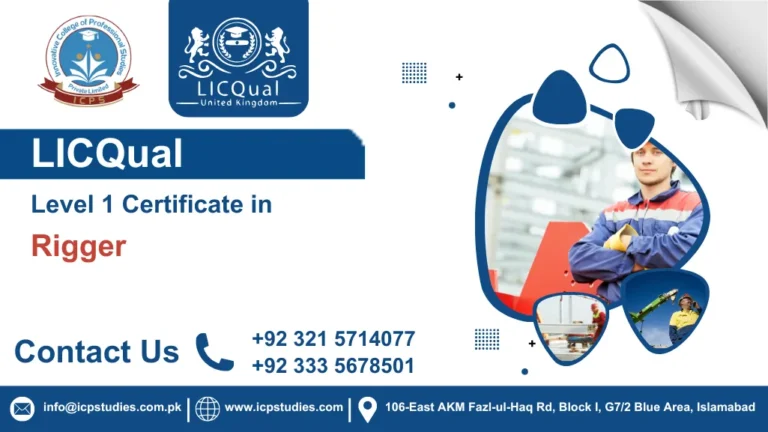In the realm of food safety, vigilance is key. Ensuring that the food we consume is free from contaminants is not only a matter of health but also a fundamental right for consumers. Heavy metals, such as lead, cadmium, mercury, and arsenic, pose significant risks to human health when present in food at elevated levels. To combat this threat, a specialized certification program has emerged: the Certificate in HACCP Heavy Metal Hazards. Let’s delve into what this certification entails and why it’s crucial in today’s food industry landscape.
The Certificate in HACCP Heavy Metal Hazards is designed to equip food industry professionals with the knowledge and skills to effectively identify, assess, and control heavy metal contamination risks in food production and processing. This certification program goes beyond traditional food safety measures to address a specific and pressing concern within the industry.
Certificate in HACCP Heavy Metal Hazards emerges as a beacon of assurance for consumers and industry stakeholders alike. By equipping professionals with the knowledge and tools to combat heavy metal contamination in food, this certification program plays a pivotal role in safeguarding public health and upholding the integrity of the food supply chain. As the food industry continues to evolve, embracing specialized certifications like HACCP Heavy Metal Hazards becomes imperative to stay ahead of emerging threats and ensure a safer, healthier future for all.
All About Certificate in HACCP Heavy Metal Hazards
Course Overview
A Certificate in HACCP Food Delivery and Storage is a specialized credential that signifies proficiency in applying Hazard Analysis Critical Control Point (HACCP) principles to the processes involved in food delivery and storage. This certification is designed for individuals and businesses involved in the food industry to ensure that they maintain the highest standards of food safety throughout the supply chain.
A Certificate in HACCP Food Delivery and Storage is an invaluable asset for anyone involved in the food industry. It equips professionals with the knowledge and tools needed to ensure that food remains safe and high-quality from the point of storage to the consumer’s doorstep. By implementing HACCP principles, businesses can not only comply with regulatory requirements but also foster consumer trust and improve overall operational efficiency.
Study Units
- Introduction to HACCP and Food Safety Management Systems
- Heavy Metal Contaminants in Food: Sources and Health Implications
- HACCP Principles and Hazard Identification for Heavy Metal Hazards
- Risk Assessment and Control Measures for Heavy Metal Contamination
- Developing and Implementing HACCP Plans for Heavy Metal Hazards
- Monitoring, Verification, and Documentation of HACCP Systems
To enroll in the Certificate in HACCP Heavy Metal Hazards course, candidates should meet the following entry requirements:
- Prior HACCP Knowledge: Completion of a foundational HACCP training course is recommended to ensure understanding of basic principles.
- Relevant Work Experience: A minimum of six months of experience in food safety, quality control, or a related field is preferred.
- Educational Background: A high school diploma or equivalent is generally required; however, individuals with relevant certifications may also qualify.
- Age Requirement: Participants must be at least 18 years old.
- Language Proficiency: Proficiency in the language of instruction is necessary for effective comprehension of course materials.
- Commitment to Food Safety: A demonstrated interest in enhancing knowledge and practices related to food safety and heavy metal hazards.
The Certificate in HACCP Heavy Metal Hazards course is designed for a range of professionals, including:
- Food Safety Managers: Individuals responsible for developing and implementing food safety programs.
- Quality Control Personnel: Staff focused on monitoring and ensuring the safety of food products.
- Regulatory Compliance Officers: Professionals ensuring that food businesses comply with health and safety regulations.
- Food Production Workers: Employees involved in the handling, processing, and preparation of food who need to understand heavy metal risks.
- Environmental Health Officers: Individuals monitoring and assessing food safety related to environmental contaminants.
- Students and Recent Graduates: Those studying food science, safety, or related fields seeking to enhance their qualifications.
This course is ideal for anyone looking to deepen their understanding of heavy metal hazards in food safety and strengthen their HACCP practices.
Learning Outcomes
Food Safety Managers and Coordinators
- Role: Overseeing food safety programs within food production and processing facilities.
- Benefit: Enhanced ability to identify and manage heavy metal hazards, ensuring comprehensive food safety practices.
2. Quality Assurance and Control Personnel
- Role: Implementing and maintaining quality control measures to meet food safety standards.
- Benefit: Improved skills in monitoring, testing, and verifying heavy metal contamination, leading to better quality assurance processes.
3. Food Processing Plant Managers
- Role: Managing daily operations in food manufacturing and processing plants.
- Benefit: Knowledge of HACCP principles specific to heavy metal hazards, helping to prevent contamination and ensure safe production practices.
4. Regulatory Agency Inspectors
- Role: Inspecting food production facilities to ensure compliance with food safety regulations.
- Benefit: Deeper understanding of heavy metal hazards and HACCP principles, aiding in more effective inspections and enforcement of regulations.
5. Environmental Health Officers
- Role: Monitoring and controlling environmental factors that impact public health, including food safety.
- Benefit: Expertise in identifying sources of heavy metal contamination and implementing measures to protect public health.
6. Researchers and Scientists in Food Safety
- Role: Conducting research on food safety issues, including contaminants and foodborne illnesses.
- Benefit: Specialized knowledge in heavy metal contamination, contributing to more informed research and innovative solutions in food safety.
7. Food Industry Consultants
- Role: Providing expert advice to food businesses on safety practices and regulatory compliance.
- Benefit: Ability to offer specialized guidance on managing heavy metal hazards, enhancing the value of consulting services.
8. Entrepreneurs and Small Business Owners
- Role: Running food-related businesses such as food trucks, catering services, or small-scale production facilities.
- Benefit: Understanding of heavy metal hazards and HACCP principles to ensure the safety and quality of their products, protecting their brand and customers.
9. Career Changers and Aspiring Professionals
- Role: Individuals looking to enter or transition into the food safety industry.
- Benefit: Gaining essential skills and certification that enhance employability and career prospects in the food industry.
10. Educational Institutions and Trainers
- Role: Educators and trainers providing food safety education and training programs.
- Benefit: Updated curriculum and training materials that include heavy metal hazards, offering comprehensive education to students and trainees.
This course is ideal for anyone involved in food production, processing, quality assurance, regulatory inspection, and food safety research. By obtaining this certification, professionals can significantly enhance their capability to manage heavy metal hazards, ensuring safer food products and compliance with regulatory standards. Whether you are an experienced food safety professional or new to the industry, the Certificate in HACCP Heavy Metal Hazards provides valuable knowledge and skills to advance your career and contribute to public health.
FAQs about Certificate in HACCP Heavy Metal Hazards







